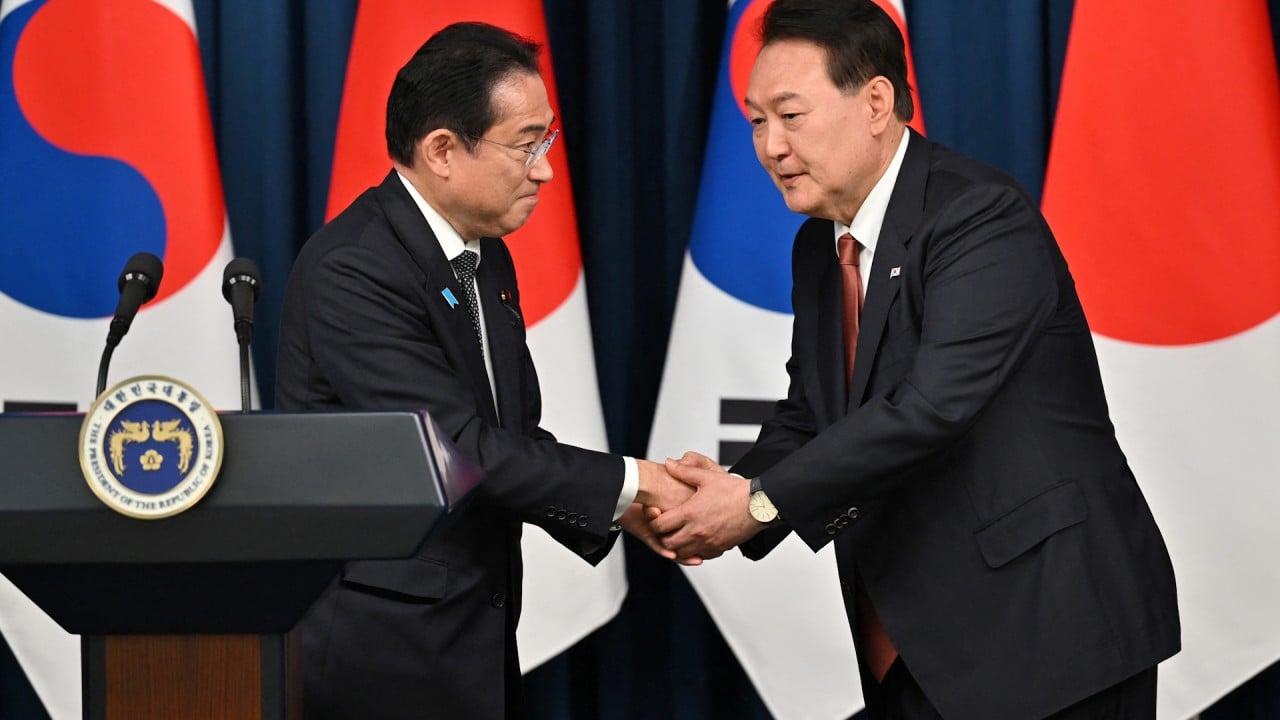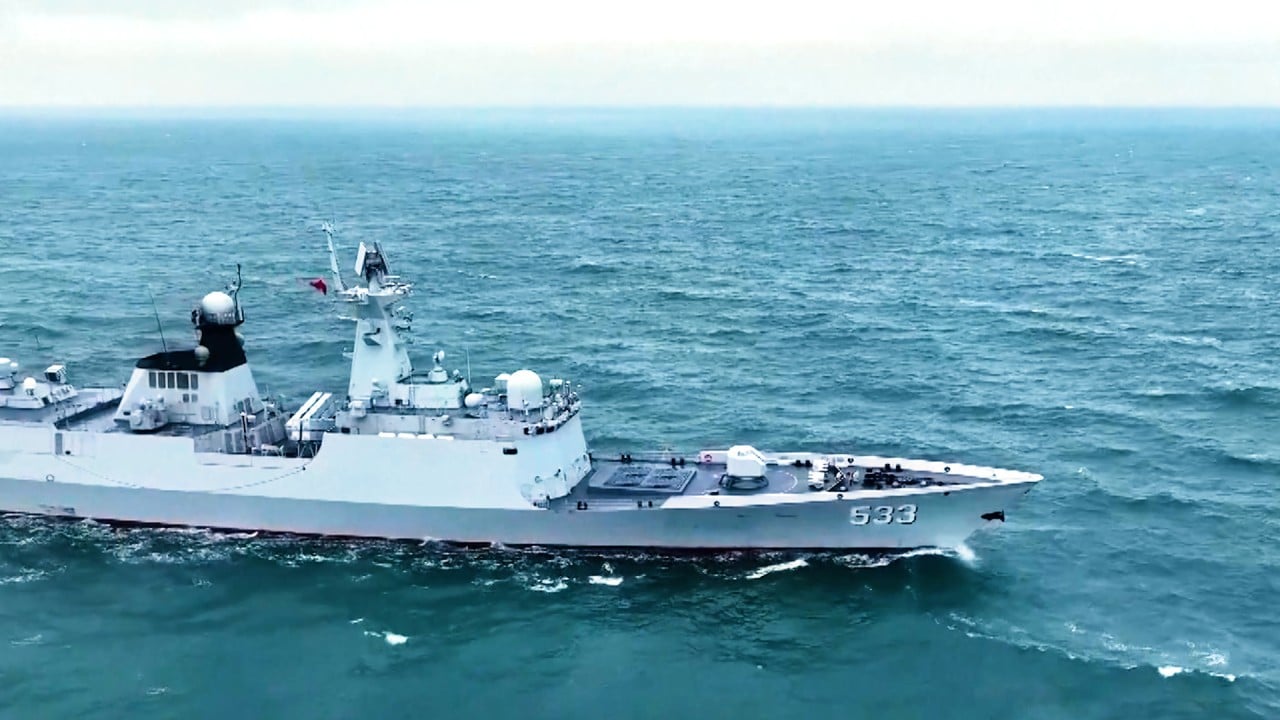
‘No high hopes’ for China at summit with Japan, South Korea, though revival of 3-way talks marks a start
- ‘Return to some level of dialogue’ expected to be main goal as China aims to pull Japan and Korea away from US orbit, according to analyst in Tokyo
- Observer in China says while hopes of concrete outcomes are low, meeting shows willingness to engage multilaterally for sake of regional stability
The move led to a swift rapprochement, and the neighbours have since restored a military intelligence-sharing agreement, reinstated a currency swap deal, and taken part in a historic trilateral summit with the United States, boosting security cooperation for the two US treaty allies.
In stark contrast, their relationship with Beijing has worsened amid escalating US-China rivalry, reaching what some analysts have called “the lowest ebb”.
The deep loss of political trust has been attributed to stronger security ties with the United States, as Japan and South Korea raise concerns over China’s growing military might. Issues such as South Korea’s economic shift away from China and China’s anger over Japan’s release of radioactive water from its damaged Fukushima nuclear plant have cast further shadows over their respective bilateral ties.
“China might not have high hopes for the summit. Although it has its own needs, the likelihood of reaching substantial consensus or implementing significant measures through this summit may not be highly anticipated by China,” said Zheng Zhihua, research associate professor at Shanghai Jiao Tong University’s Centre for Japanese Studies.
Li and Kishida are expected to arrive in Seoul tomorrow, with bilateral meetings and a banquet on the cards ahead of Monday’s three-way summit. The last such summit was hosted by China in December 2019.
Stephen Nagy, a professor of international relations at the International Christian University in Tokyo, said the main goal of the gathering was to “return to some level of dialogue” among the three countries.
“China hopes to use this venue to induce Japan and the ROK to distance themselves from the US and to engage with China at the economic and cultural level, while Japan and South Korea are engaging to avoid the perception that they are not engaging with China,” Nagy said, using the acronym for South Korea’s official name – the Republic of Korea.
The remarks were echoed by Zheng, who said that despite low hopes of concrete outcomes, “gathering the three leaders together is a gesture demonstrating that the three countries have not abandoned diplomatic efforts and multilateral engagement” to keep the regional security situation relatively stable and prevent rapid deterioration.
“Although there is a general sense of pessimism about the future, it doesn’t necessarily mean the three nations are immediately headed for a bipolar or bloc confrontation in Northeast Asia,” Zheng said. “I believe we are not yet prepared for that.”
Driving the push for the revived summit was the mutual recognition of the need for regional stability and the uncertain economic outlook for the region, supply chain instabilities and the lingering economic impact of the Covid-19 pandemic, Zheng said.
In 2022, Japan enacted its Economic Security Promotion Act to reduce economic dependencies by diversifying supply chains and imposing strict regulations on exports of sensitive technologies like semiconductors.
Similarly, South Korea’s “3050 strategy” initiative introduced in December aims to diversify the supply of 185 critical materials as part of an initiative to more than halve the country’s dependence on China by 2030.
Moreover, the US has replaced China as South Korea’s top export market, a shift described by Chinese analysts as strategic recalculations influenced by Washington, though Beijing remains Seoul’s biggest trading partner.
Zheng said that the curbs on chip exports to China might become an irreversible trend as Japan and Korea become more vigilant about national security, making it difficult for Beijing to overcome the supply chain disruption in high-end chips.
Divergences on the geopolitical front are also expected to loom large over the summit.
“The ROK and Japan have committed themselves to selective diversification away from China in technology and other key areas, [and] they are [also] enhancing their deterrence, resilience and cooperation to manage the US-China strategic competition,” Nagy said.
He said Japan had continued to expand the appeal of the US-led “free and open Indo-Pacific” initiative, attracting increasing support from like-minded nations.
Meanwhile, Japan has strengthened its defence situation through the Reciprocal Access Agreement with Australia and Britain, boosting training and exercises among their armed forces, and actively engaged in multilateral forums to promote the recognition of Taiwan as a global public good, according to Nagy.
Beijing sees Taiwan as part of China to be reunited by force if necessary. Most countries, including the US, Japan and South Korea, do not recognise Taiwan as an independent state. However, Washington is opposed to any attempt to take the self-governed island by force and is committed to arm Taiwan.
Beijing lodged solemn representations after Japanese and South Korean officials took part in new Taiwanese leader William Lai Ching-te’s inauguration ceremony on May 20.
A group of 31 bipartisan Japanese lawmakers attended the ceremony, the largest delegation ever for such an event. And although Seoul did not send an official delegation, its representative in Taiwan attended, and several South Korean lawmakers travelled to Taipei on the occasion
Many observers expect Taiwan to figure in the discussions in Seoul. However, Nagy said that Beijing had to “tread carefully” at the summit, to avoid creating an impression that it had “just come to lecture Japan and South Korea as supplicants in the relationship”.
“Complaining about delegations to Taiwan may actually backfire in Tokyo and Seoul but will play well to China’s domestic audience,” he said.
Also, statements from Beijing suggesting that Japanese and Korean security concerns over China were the result of believing a US narrative aimed at maintaining its global dominance were likely to backfire, Nagy warned.
“This kind of comment is insulting for both Tokyo and Seoul as it sends the message that they do not have autonomy in foreign policy.”
But still, the three countries can work on their strengths for the common good, such as renewable energy, according to Zheng.
“Trilateral cooperation could leverage on their strength and accumulated technical expertise, focusing on areas that are not sensitive to national security but involve global concerns,” Zheng said.
Efforts on renewable energy cooperation would be meaningful as this is critical to addressing climate change, he added.
“Increasing investment and cooperation in renewable energy and climate change mitigation can not only underscore their leadership but also bring significant benefits to the global community.”



